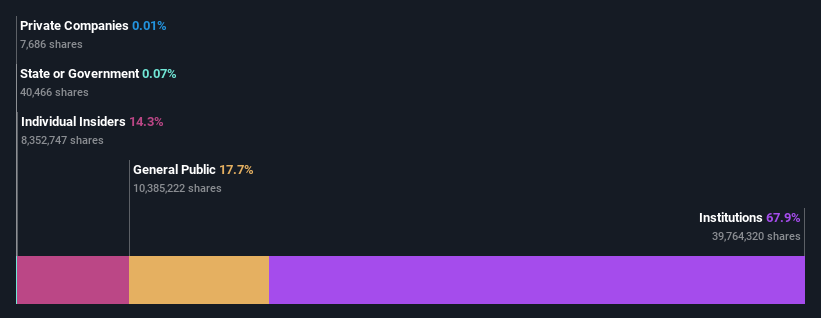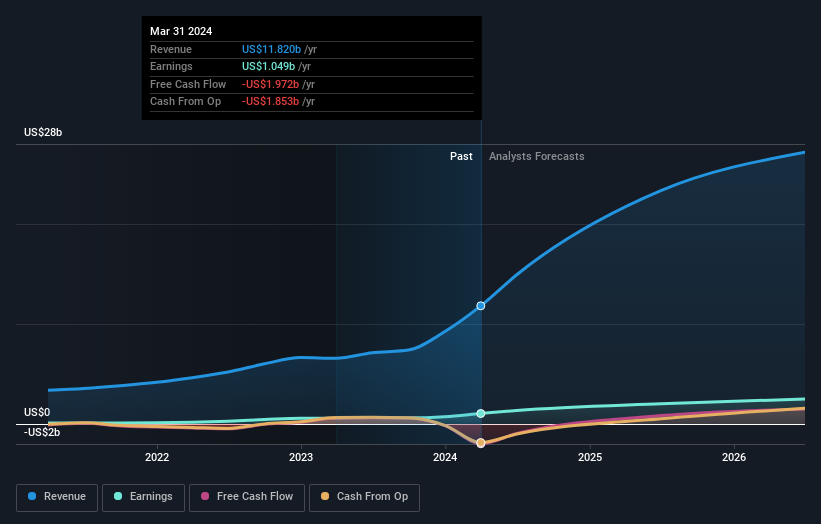Super Micro Computer, Inc.'s (NASDAQ:SMCI) high institutional ownership speaks for itself as stock continues to impress, up 4.9% over last week
Key Insights
Given the large stake in the stock by institutions, Super Micro Computer's stock price might be vulnerable to their trading decisions
The top 12 shareholders own 51% of the company
If you want to know who really controls Super Micro Computer, Inc. (NASDAQ:SMCI), then you'll have to look at the makeup of its share registry. And the group that holds the biggest piece of the pie are institutions with 68% ownership. Put another way, the group faces the maximum upside potential (or downside risk).
Last week’s 4.9% gain means that institutional investors were on the positive end of the spectrum even as the company has shown strong longer-term trends. The one-year return on investment is currently 486% and last week's gain would have been more than welcomed.
Let's take a closer look to see what the different types of shareholders can tell us about Super Micro Computer.
See our latest analysis for Super Micro Computer
What Does The Institutional Ownership Tell Us About Super Micro Computer?
Institutional investors commonly compare their own returns to the returns of a commonly followed index. So they generally do consider buying larger companies that are included in the relevant benchmark index.
We can see that Super Micro Computer does have institutional investors; and they hold a good portion of the company's stock. This can indicate that the company has a certain degree of credibility in the investment community. However, it is best to be wary of relying on the supposed validation that comes with institutional investors. They too, get it wrong sometimes. It is not uncommon to see a big share price drop if two large institutional investors try to sell out of a stock at the same time. So it is worth checking the past earnings trajectory of Super Micro Computer, (below). Of course, keep in mind that there are other factors to consider, too.
Since institutional investors own more than half the issued stock, the board will likely have to pay attention to their preferences. Super Micro Computer is not owned by hedge funds. Our data shows that BlackRock, Inc. is the largest shareholder with 11% of shares outstanding. In comparison, the second and third largest shareholders hold about 11% and 9.1% of the stock. Charles Liang, who is the third-largest shareholder, also happens to hold the title of Chairman of the Board.
A closer look at our ownership figures suggests that the top 12 shareholders have a combined ownership of 51% implying that no single shareholder has a majority.
Researching institutional ownership is a good way to gauge and filter a stock's expected performance. The same can be achieved by studying analyst sentiments. Quite a few analysts cover the stock, so you could look into forecast growth quite easily.
Insider Ownership Of Super Micro Computer
The definition of company insiders can be subjective and does vary between jurisdictions. Our data reflects individual insiders, capturing board members at the very least. Management ultimately answers to the board. However, it is not uncommon for managers to be executive board members, especially if they are a founder or the CEO.
Most consider insider ownership a positive because it can indicate the board is well aligned with other shareholders. However, on some occasions too much power is concentrated within this group.
Our most recent data indicates that insiders own a reasonable proportion of Super Micro Computer, Inc.. Insiders own US$6.9b worth of shares in the US$48b company. That's quite meaningful. It is good to see this level of investment. You can check here to see if those insiders have been buying recently.
General Public Ownership
The general public-- including retail investors -- own 18% stake in the company, and hence can't easily be ignored. While this size of ownership may not be enough to sway a policy decision in their favour, they can still make a collective impact on company policies.
Next Steps:
While it is well worth considering the different groups that own a company, there are other factors that are even more important. Take risks for example - Super Micro Computer has 4 warning signs (and 2 which are a bit unpleasant) we think you should know about.
Ultimately the future is most important. You can access this free report on analyst forecasts for the company.
NB: Figures in this article are calculated using data from the last twelve months, which refer to the 12-month period ending on the last date of the month the financial statement is dated. This may not be consistent with full year annual report figures.
Have feedback on this article? Concerned about the content? Get in touch with us directly. Alternatively, email editorial-team (at) simplywallst.com.
This article by Simply Wall St is general in nature. We provide commentary based on historical data and analyst forecasts only using an unbiased methodology and our articles are not intended to be financial advice. It does not constitute a recommendation to buy or sell any stock, and does not take account of your objectives, or your financial situation. We aim to bring you long-term focused analysis driven by fundamental data. Note that our analysis may not factor in the latest price-sensitive company announcements or qualitative material. Simply Wall St has no position in any stocks mentioned.


